As the war grinds on, Ukraine struggles with the punishment of collaborators in occupied territories. Some are plainly considered as traitors who actively helped the Russian enemy. Others just continued earning their bread. And what to think of the inhabitants of Crimea, who welcomed the annexation and gladly accepted Russian passports? Jurists, parliamentarians and human rights activists hotly debate the law on collaboration, says Igor Burdyga for openDemocracy.
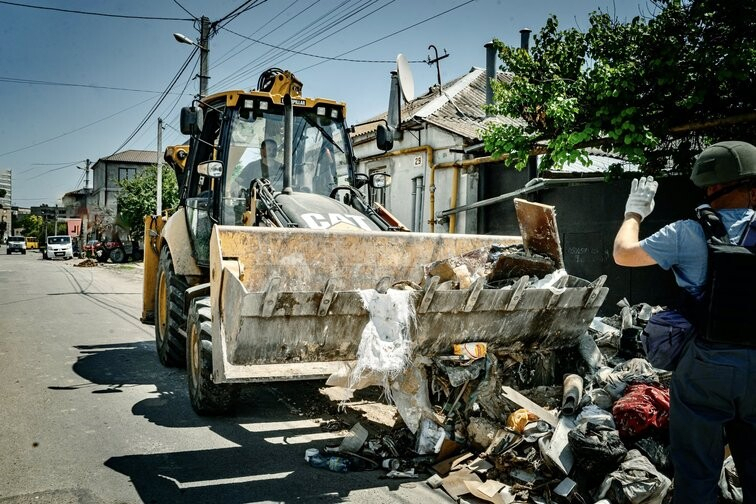 Kherson's main garbage collectors on trial for 'collaboration (picture Igor Burdyga)
Kherson's main garbage collectors on trial for 'collaboration (picture Igor Burdyga)
by Igor Burdyga
On a cool morning, the silence of Kherson’s old city centre is broken by a huge rubbish bin being overturned on the pavement. Two men in bulletproof vests calmly scoop the contents onto the road. Dima, a local volunteer coordinator, observes the fetid heap from his porch. 'Don't worry, they’re from the council,' he says, cutting short my rising indignation.
A tractor turns the corner, followed by a dozen men and women with shovels, also wearing bulletproof vests. A few minutes later, the rubbish is in the tractor’s trailer. The group moves on as the first Russian shelling of the day starts up.
There’s a simple explanation for this strange sight: the owners of Kherson’s main garbage collection company have been arrested and their trucks seized. Alena and Dmitry Dubrovsky, who ran the company for 20 years, are facing charges of wartime collaboration for continuing to work between March and November 2022, when Kherson was under Russian occupation.
The regional police department and prosecutors claimed that last summer the Dubrovskys supported Russia’s introduction of the ruble, opened company accounts in a Russian bank and paid taxes to the occupying administration. In other words, they 'carried out economic activities in close cooperation with the aggressor state' and 'transferred material resources to the occupiers'. This is regarded as wartime collaboration and aiding the aggressor state, the penalties for which are up to five and 12 years in prison, respectively.
The Dubrovskys’ case is one of thousands that are testing Ukraine’s new collaboration law – a law that is currently being challenged by politicians for being too blunt in its punishment of people in occupied territories.
Kherson city court reopened in June, and the Dubrovskys’ case is the first to be heard. They’ve been in custody for four months and have pleaded not guilty. Their legal counsel refused to forward openDemocracy’s questions to the Dubrovskys or to comment on the case, which is ongoing. The prosecutor’s office also declined to comment.
Their garbage trucks remain under lock and key. The city has not been able to secure their release – even for temporary use after the Kakhovka dam explosion flooded Kherson in June.
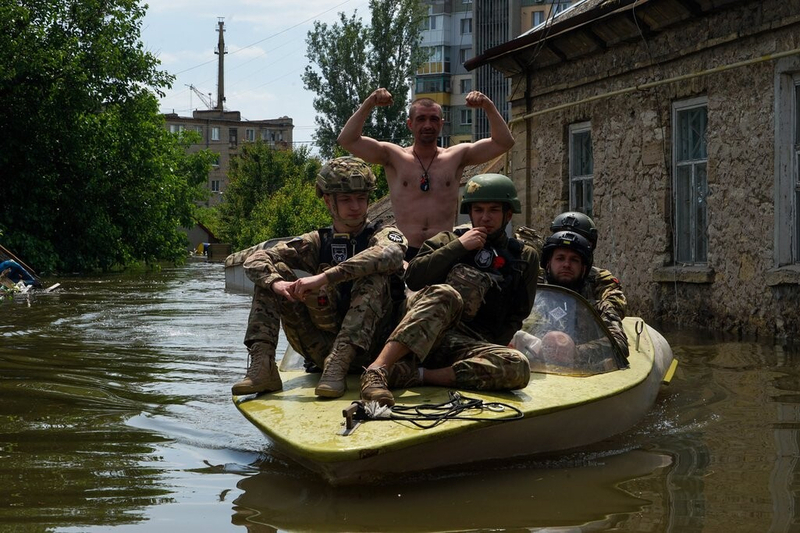 Kherson flooded after the Russians blasted the Kakhova dam (picture Igor Burdyga)
Kherson flooded after the Russians blasted the Kakhova dam (picture Igor Burdyga)
Traitor database
According to the Kherson prosecutor’s office, more than 1,000 investigations into collaboration had been filed by the end of June, though only 50 sentences have been handed down so far. Another 234 investigations involve allegations of aiding Russia.
Most of these investigations were started while Kherson was still under Russian occupation, before Ukrainian forces retook control of parts of the east bank of the Dnipro river directly opposite Kherson. The local branch of the Security Service of Ukraine (SBU) has been investigating residents – primarily those who cooperated publicly with the Russians – and trying them in absentia.
When the city was liberated, leading collaborators such as Vladimir Saldo, head of the regional occupation administration, fled alongside the Russian army. But not everyone left. Law enforcement officers have been reporting daily about their detention of policemen, public officials, head doctors of hospitals, teachers who adopted the Russian curriculum, organisers of the so-called ‘referendum’ in September 2022 on joining the Russian Federation, and other suspected collaborators.
So far, only one in every six investigations has resulted in charges, totalling 159 for collaboration and 33 for complicity with the aggressor.
Many more suspects are listed on Kherson’s ‘traitor database’, an anonymous Telegram channel that publishes data on citizens accused of ties with the Russian authorities. Between one and five new 'dossiers' are released on the channel daily.
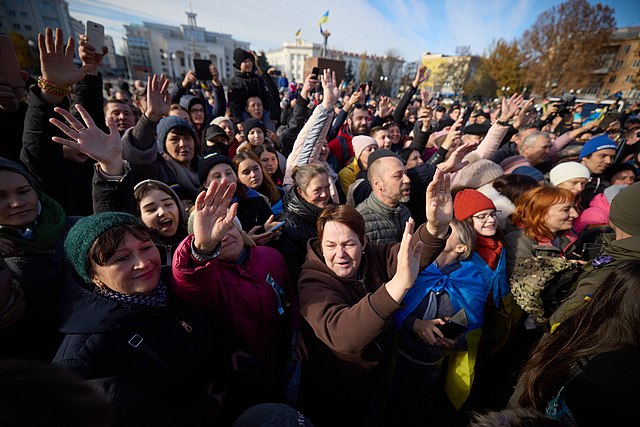 Celebrations after the liberation of Kherson. Now the Russians pound the city again.
Celebrations after the liberation of Kherson. Now the Russians pound the city again.
The channel administrator, nicknamed Nulledo, told openDemocracy that by the end of July the channel had identified at least 2,000 collaborators – 'but as a percentage of the total population, there aren’t that many.' (There are one million people in the Kherson region.)
He finds most of his information via social media or networks associated with the occupation. Subscribers to the channel – some 35,000 of them – also send him information.
Nulledo evaded openDemocracy’s questions about payment and refused to clarify whether he works officially for Ukrainian law enforcement or security services. 'I'm just helping the SBU speed up the processes a bit,' he said – but he did give us an example of his cooperation with an official investigation.
In February, Nulledo asked subscribers to help him collect evidence against a city resident, Rza Rzayev, who allegedly worked as the supply manager of Kherson’s main market during the Russian occupation. Nulledo does not explain what evidence was collected, but two weeks later police arrested Rzayev and another market worker. In June, they were accused of collaborating and aiding the aggressor, in collusion with the market’s director and chief accountant, who have fled the city. Rzayev denies the charges.
Why did people like Rzayev remain in Kherson after it was liberated? Nulledo said some stayed to look after their property, some hoped to buy their way out of any investigation, and others simply didn’t realise they had committed a crime. He hopes the Ukrainian courts will deliver justice and 'everyone will get what they deserve'.
No clear definition of collaboration
Wartime collaboration was added to Ukraine’s criminal code a few days after the full-scale Russian invasion in February 2022.
Andriy Osadchuk MP, the first deputy chair of the parliamentary committee that oversees all amendments to the criminal code, told openDemocracy the process of passing the new collaboration law was 'historic'. It was only the second time Ukrainian MPs had been able to gather after the invasion a week before, and 300 deputies adopted the laws without discussing them. Ukraine’s parliamentary opposition had its own proposal on the new collaboration law, but there was no time for political disputes under urgent conditions of war.
'The occupiers were not only on the outskirts of Kyiv, but in eight of our regions. And there were people who were helping them, and we didn’t have a separate punishment for them,' Osadchuk said. 'Unfortunately, before the big war, no one wanted to work on this. That’s why we passed what we had prepared in extreme conditions.'
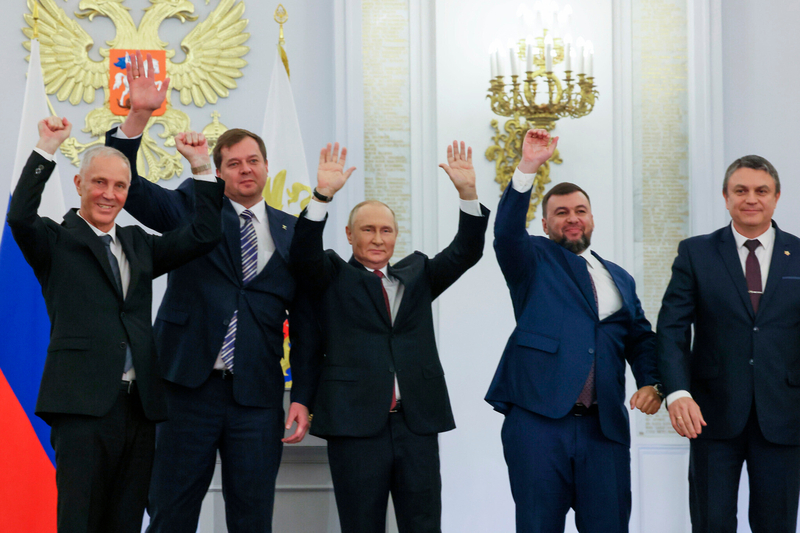 Collaborators after the annexation ceremony of 4 Ukrainian provinces in the Kremlin on 30 september 2022. f.l.t.r: Vladimir Saldo, head of Kherson, Yevgeny Balitsky, head of Zaporizhzhia region, Putin, Denis Pushilin, leader of Donetsk People's Republic and Leonid Pasechnik, leader of Luhansk People's Republic. (picture Kremlin)
Collaborators after the annexation ceremony of 4 Ukrainian provinces in the Kremlin on 30 september 2022. f.l.t.r: Vladimir Saldo, head of Kherson, Yevgeny Balitsky, head of Zaporizhzhia region, Putin, Denis Pushilin, leader of Donetsk People's Republic and Leonid Pasechnik, leader of Luhansk People's Republic. (picture Kremlin)
Since then, Osadchuk said, nearly 6,000 cases of collaboration have been opened across Ukraine, more than 1,700 charges have been filed, and about 1,000 have already been submitted to the courts – although about half of them have been heard in absentia, without the accused present.
The hastily adopted law did not introduce a clear definition of wartime collaboration
'All this is the result of our work that day,' Osadchuk said.
The hastily adopted law did not introduce a clear definition of what constitutes wartime collaboration. Instead, it lists eight forms of collaboration, from denying foreign aggression online to serving in the Russian armed forces – which is considered a particularly serious crime. Punishments also vary widely.
Examples of punishments for collaboration
For working an ordinary public job on behalf of the occupying forces, there’s a temporary ban on working for Ukrainian state institutions; for a managerial post, the penalty is up to ten years in prison; for working in the judicial system or the police, up to 15 years. Teachers who promoted the occupation and used the Russian curriculum can receive up to three years in prison. Referendum organisers face up to ten years behind bars, and organisers of pro-occupation rallies up to 12 years.
Just three weeks after the new law was adopted, amendments allowed those accused to be tried in absentia, or kept in custody without bail or house arrest.
Another serious offence was also added to Ukraine’s criminal code: 'complicity with the aggressor state'. This is defined as any deliberate activity to help the invaders to the detriment of Ukraine. It includes implementing or simply supporting the decisions of the occupation administration, or the collection and transfer of material resources or any other assets to them.
Osadchuk admitted the wording of the two new laws against collaboration and complicity are too general, echoing each other and other national security offences, including treason.
Various authorities have since tried to explain to the Ukrainian public what kind of activity would be considered criminal, but their explanations have often been contradictory, leaving citizens confused.
Inconsistancy and dissatisfaction
In the first investigations against pro-Russian politicians who met the invaders with bread and salt, the case for collaboration seemed clear.
But as Ukrainian law enforcement arrived back in liberated territories across the country, their approaches have begun to differ greatly, with charges and penalties varying considerably from region to region.
Last year, a coalition of Ukrainian human rights organisations analysed how collaboration cases are prosecuted – and found some shocking examples. In Kharkiv, social media posts supporting Russian aggression were treated as ‘mild’ collaboration (punishment: a ban on taking public sector jobs), while in Chernihiv similar episodes were considered 'glorification of the aggressor' (punishment: five to eight years in prison).
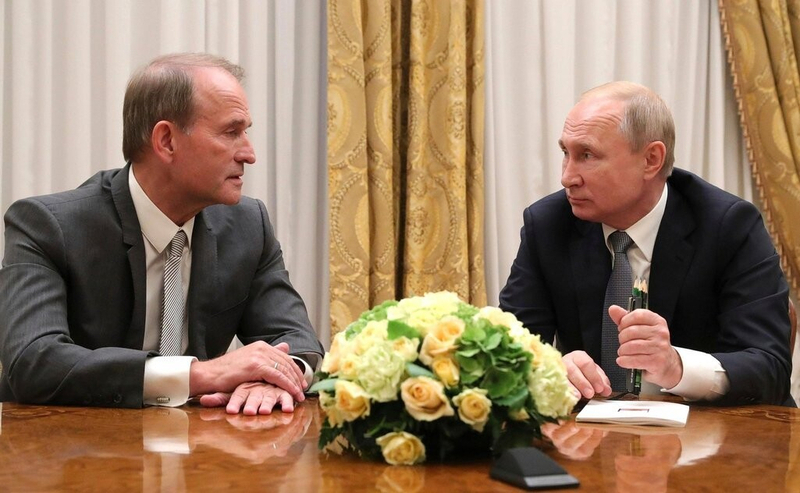 Putin had big plans with Ukraine's pro-Russian politician Viktor Medvedchuk, whose daughter is Putin's godchild. Medvedchuk was captured by the Ukrainians and later exchanged for Ukrainian prisoners of war (picture Kremlin)
Putin had big plans with Ukraine's pro-Russian politician Viktor Medvedchuk, whose daughter is Putin's godchild. Medvedchuk was captured by the Ukrainians and later exchanged for Ukrainian prisoners of war (picture Kremlin)
The application of charges and penalties also vary at the more serious end of the spectrum. The head of the 'state bank of the Luhansk People’s Republic' faced five to ten years in prison for 'collaboration'; the head of a Russian bank in Kherson faced ten to 12 years for 'aiding the aggressor'. The commander of a firefighting brigade in occupied Berdyansk was charged with serious collaboration (12 to 15 years), his colleague in Starobilsk with high treason (15 years to life).
'These cases run the risk of becoming a conveyor belt for statistics, which does not correspond to the demand for justice in society, nor does it prevent these crimes,' one of the authors of the report, lawyer Daria Sviridova, commented.
In a series of publications by the Ukrainian Helsinki Human Rights Union, lawyers, judges and even prosecutors concluded that Ukrainian law enforcement often simply fits the actions of suspects to the wording of the criminal code.
One judge in Lviv has even urged her colleagues to stop accepting plea bargains in collaboration cases, because it means they are not evaluating evidence or delving into the motives of defendants.
'Collaboration trials can become a platform for restoring justice, public understanding and laying the foundations for future reconciliation, if these trials are held publicly and openly,' judge Kateryna Kotelva wrote in December last year.
In turn, a leading prosecutor recommended separating 'humanitarian' collaboration with Russian forces – e.g. working in housing, transport or other public services, which supports basic necessities under occupation – from 'deliberate' collaboration.
The case of Crimea
It is residents of Crimea – who believe that the war with Russia will end with the de-occupation of their peninsula – who have most actively opposed Ukraine’s new law on collaboration, because it potentially affects them all. If Crimea was liberated tomorrow, at least 200,000 Crimeans would face collaboration charges, according to Tamila Tasheva, the Ukrainian president’s representative on Crimea.
'All these years, we have been talking to Crimeans, explaining that they are not traitors and that a significant proportion of them are victims of an armed conflict,' explained Ihor Ponochovny, head of the Ukrainian prosecutor’s office for Crimea and Sevastopol. As of June, Ponochovny’s team has been responsible for only around 100 collaboration investigations.
By contrast, Tasheva’s de-occupation strategy proposes only individuals who actively contributed to the occupation of Crimea should face charges.
Under this plan, officials and teachers would have to go through 'lustration' (an examination of their actions to ensure they were not active collaborators), while business people, accountants, doctors and so on would not be punished simply for staying in Crimea, working and paying taxes to the Russian state. That proposal has since been kicked back on the basis that Ukraine should not have a separate criminal law for each region.
 Priest Sergey Fomenko from Krasny Liman in the Donbass met the Russians enthusiastically
Priest Sergey Fomenko from Krasny Liman in the Donbass met the Russians enthusiastically
Proposed amendments
Several further amendments have been suggested since Ukraine’s collaboration law was first adopted in spring 2022. Serhiy Ionushas MP, head of the parliamentary committee that oversees the criminal code, proposed reducing punishments for 'non-serious' acts to community service or fines, while others have argued for increasing prison terms for lawyers who worked with Russian occupiers.
The Ukrainian government, in turn, has proposed that providing or supporting medical care, pensions, critical infrastructure, public utilities, retail, catering and agriculture should not be considered collaboration. Agriculture is a key concern, as millions of hectares of farming land remain under Russian occupation.
Ionushas and Osadchuk’s committee has now written its own amendments bill, but refuses to disclose any details, saying it is waiting for legal assessment. This new bill has been written in conjunction with the former mayor of Melitopol, businessman and MP Serhiy Minko. In conversation with openDemocracy, Minko said the existing legislation 'had fulfilled its main function' – preventing people from collaborating with Russia. The new version, he said, would be less radical.
Indeed, Osadchuk claimed the intention now is to scare away collaborators from remaining in the liberated territories. 'We're going to narrow down the liability, so that punishment turns from a cannon into a sniper rifle,' he told openDemocracy.
MPs will no longer be able to adopt new amendments in a single vote, so Osadchuk predicts fierce discussions in Parliament and beyond. If Parliament does not consider them in the first reading before the end of August, then the law will not be changed until the end of the year.
This article was written for openDemocracy.
